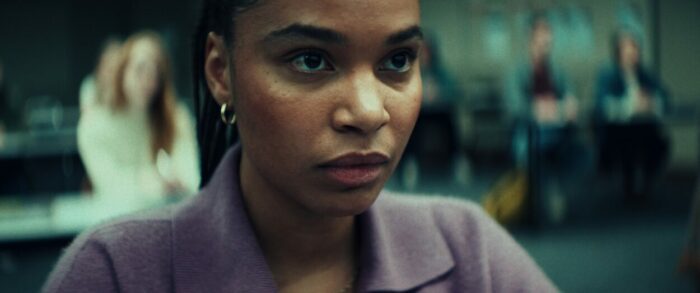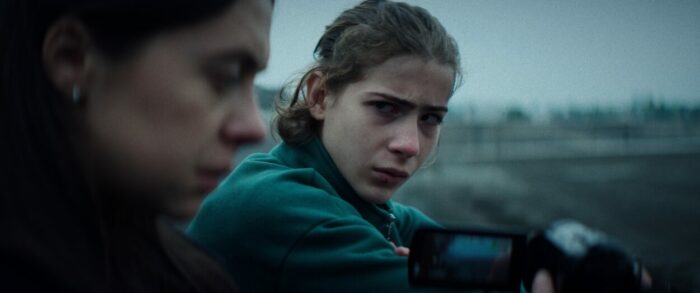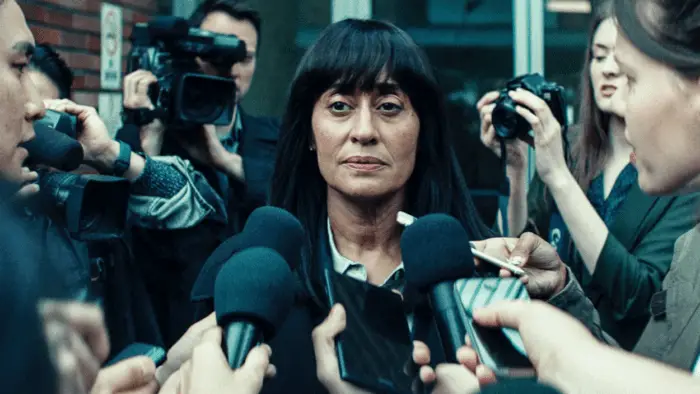There’s a cold-blooded comeback line in the slow-boil journalism thriller Cold Copy where the merciless veteran chops down the idealist rookie to say, “Truth is the word you use when you don’t have an answer.” Read that back to yourself one more time. In that exchange, the seasoned pro is calling out the work ethic of the subordinate for not finding and filling in more of the story while simultaneously trivializing the value of getting all the facts. Methodology like that is something that goes against tried-and-true journalism, yet the line is said with such cocky assurance that it reads like an axiom that should be universally accepted.
All that frost; and frost is precisely the sordid tone and temperature of Cold Copy. The drama at hand is not seeking comfort or heroism within the championed profession. It’s a duel of who prods enough to get the last word or final competitive undercut. While plenty interesting, Cold Copy may or may not be the kind of seedy dive you are willing to embrace.

Cold Copy follows Mia Scott, played by indie favorite Bel Powley of The Diary of a Teenage Girl. She’s a booksmart, nebbish, and very goal-driven college student looking to break into upper level television journalism. When we are introduced to Mia, she’s rehearsing her portfolio and pitch to score a spot in a journalism class taught by her idol, The Night Report’s lead television investigative reporter Diane Heger. Played by Black-ish TV maven Tracee Ellis Ross, Diane is the epitome of “meaning business.” To hear her tell it, being a journalist is a persona rather than a vocation.
Powley and Ross’s characters meet for the first time in an outstanding job interview scene scripted and directed by Roxine Helberg making her feature film debut. After thumbing through Mia’s vitae with complete disinterest, Diane asks the question, “What kind of stories do you want to tell?” Mia’s very scripted and safe answer centering on the grand quest for truth reveals that she doesn’t have a cutthroat bone in her body on first impression. Unmoved, Diane reads her like a book and admonishes Mia enough to get her to turn and leave. Before entirely exiting, Mia breaks her composure and claps back at Diane’s icy attitude.

That little ember of potential heat scores Mia the last spot in the class. Moving forward, the objective of Diane’s highly competitive course is research, shoot, and produce a 20-minute investigative segment. Whoever brings in the best story scores an on-air segment on The Night Report and potential job opportunities. That’s the brass ring for both Mia and her more favorable roommate (Nesta Cooper of Bliss and The Edge of Seventeen). Sure enough, the favored get favoritism as asses get kissed and egos get polished.
After several dead-ends, Mia finds a potential story subject when the wayward dean Igor Nowak (Jacob Tremblay, all grown up from Room and Wonder) comes to her defense on an abusive date. The artistically-driven Igor is the son of famous children’s author Charlotte Nowak who died recently in mysterious circumstances. The family has demanded total privacy and has not spoken to the media. Mia– already too close– befriends the teenager in hopes of leveraging that relationship into a family profile scoop that exposes what really happened to the family matriarch. Such a proposition has plain-as-day horrible and disrespectful consequences, yet Mia’s warped ambition and Diane’s pressure leads her to ignore those ethics.

Cold Copy churns when Tracee Ellis Ross and Bel Powley continue these ideological clashes and tests of mettle during the course of this Nowak project. Decked in impeccable costuming and crowned by devious bangs, Ross comports herself with venomous and unflappable poise that is darkly delightful to watch. She’s immediately a bossy bitch character you love to hate. Meanwhile, it’s up to Bel Powley to carry the moral descent of Cold Copy. With beleaguered bags under her tired blue eyes, she portrays the naive petulance necessary to not see the screwjob that’s coming a mile away. Their combative chemistry is greatly appreciated.
Waiting for either failure or comeuppance to arrive in Cold Copy is its own patient challenge. For that to work and much like the “what’s the story” question posed by the TV star and professor, the central investigative story needs to be titillating, or at least involving, enough to pull the audience in with the same obsession it does for Mia’s character. While it is commendable to see Jacob Tremblay take a challenging part to age up like fellow 21st century child actors Asa Butterfield, Oakes Fegley, Kiernan Shipka, and others in recent years, the penetrative story is not there to take Cold Copy over the top.

With that lessened grip underneath Lamb composer Tóti Guðnason’s edgy electronic score, Cold Copy has to rely on Ross and Powley, which is not the worst place to settle. The aims of their characters to shake power structures, become the story, and– in the end– manipulate people and truths all hold firm enough attention. When the Nowak story culminates and leaves the apparent climax behind, Helberg’s screenplay lingers for one more rematch showdown between the two that seals that deal. Hang in for that makeup payoff.




